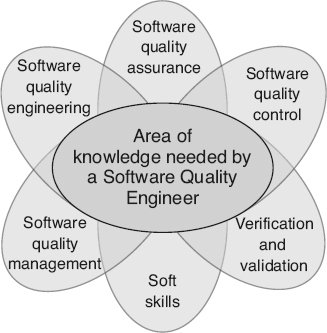The Certified Software Quality Engineer Handbook
Second Edition
Also available from ASQ Quality Press:
Practical Process Validation
Mark Allen Durivage and Bob (Bhavan) Mehta
Principles of Quality Costs, Fourth Edition: Financial Measures for Strategic Implementation of Quality Management
Douglas C. Wood, editor
Jurans Quality Handbook, Seventh Edition: The Complete Guide to Performance Excellence
Joseph A. De Feo
The Certified Six Sigma Black Belt Handbook, Third Edition
T.M. Kubiak and Donald W. Benbow
Quality Audits for Improved Performance, Third Edition
Dennis R. Arter
The ASQ Auditing Handbook, Fourth Edition
J.P. Russell, editor
The Internal Auditing Pocket Guide: Preparing, Performing, Reporting, and Follow-Up, Second Edition
J.P. Russell
Root Cause Analysis: Simplified Tools and Techniques, Second Edition
Bjrn Andersen and Tom Fagerhaug
The Certified Manager of Quality/Organizational Excellence Handbook, Fourth Edition
Russell T. Westcott, editor
The Probability Handbook
Mary McShane-Vaughn
Practical Design of Experiments (DOE): A Guide for Optimizing Designs and Processes
Mark Allen Durivage
The ISO 9001:2015 Implementation Handbook: Using the Process Approach to Build a Quality Management System
Milton P. Dentch
To request a complimentary catalog of ASQ Quality Press publications,
call 800-248-1946, or visit our Web site at http://www.asq.org/quality-press.
The Certified Software Quality Engineer Handbook
Second Edition
Linda Westfall
ASQ Quality Press
Milwaukee, Wisconsin
American Society for Quality, Quality Press, Milwaukee, WI 53203
2016 by ASQ
All rights reserved. Published 2016.
Printed in the United States of America.
22 21 20 19 18 17 16 5 4 3 2 1
Names: Westfall, Linda, 1954- author.
Title: The certified software quality engineer handbook / Linda Westfall.
Description: Second edition. | Milwaukee, Wisconsin : ASQ Quality Press, 2016. | Includes bibliographical references and index.
Identifiers: LCCN 2016052747 | ISBN 9780873899390 (alk. paper)
Subjects: LCSH: Electronic data processing personnelCertification. | Computer software--Examinations--Study guides. | Computer software--Quality control.
Classification: LCC QA76.3 .W466 2016 | DDC 004.092--dc23
LC record available at https://lccn.loc.gov/2016052747
No part of this book may be reproduced in any form or by any means, electronic, mechanical, photocopying, recording, or otherwise, without the prior written permission of the publisher.
Director of Products, Quality Programs: Ray Zielke
Managing Editor: Paul Daniel OMara
Sr. Creative Services Specialist: Randy L. Benson
ASQ Mission: The American Society for Quality advances individual, organizational, and community excellence worldwide through learning, quality improvement, and knowledge exchange.
Attention Bookstores, Wholesalers, Schools, and Corporations: ASQ Quality Press books, video, audio, and software are available at quantity discounts with bulk purchases for business, educational, or instructional use. For information, please contact ASQ Quality Press at 800-248-1946, or write to ASQ Quality Press, P.O. Box 3005, Milwaukee, WI 53201-3005.
To place orders or to request ASQ membership information, call 800-248-1946. Visit our Web site at www.asq.org/quality-press.

Printed on acid-free paper
Dedication
For Robert Westfall, my husband, my partner, my best friend, and my playmate. Thank you for all of your support and patience while I wrote this book and as I volunteered countless hours to ASQ and other organizations over the years. Thank you for sharing your life with me, making me laugh out loud, cooking all of those fantastic meals, and sharing your passion for fireworks with me. Life with you continues to be a blast!!!
Table of Contents
Glossary with page numbers
SampleExam1.pdf
SampleExamAnswers1.pdf
SampleExam2.pdf
SampleExamAnswers2.pdf
SampleExam3.pdf
SampleExamAnswers3.pdf
C ontinuous improvement is a mantra implicit to the quality profession. So as software quality engineers, we should not be surprised our own discipline has continued to evolve and change. By practicing what we preach in our own field, adopting lessons learned from implementing software quality principles and practices, and proactively staying involved in managerial, procedural, and technological advances in software engineering and the quality arena, software quality engineers have learned to increase the value they add to the end software products.
One of the primary roles of a software quality engineer is to act as a management information source that keeps software quality as visible to software management as cost and schedule are when business plans and decisions need to be made. In order to fulfill this role, software quality engineers must continuously improve their skill and knowledge sets. The software quality profession has moved beyond the limits of using only testing or auditing as the primary tools of our trade. Software quality has emerged into a multi-faceted discipline that requires us, as software quality engineers, to be able to understand and apply knowledge that encompasses:
Software quality management. The processes and activities involved in setting the organizations strategic quality goals and objectives, establishing organizational, project, and product quality planning, and providing the oversight necessary to ensure the effectiveness and efficiency of the organizations quality management system. Software quality management provides leadership and establishes an integrated, cross-functional culture where producing high-quality software is just the way we do things around here.
Software quality engineering. The processes and activities needed to define, plan, and implement the quality management system for software-related processes, projects, and products. This includes defining, establishing, and continuously improving software-related systems, policies, processes, and work instructions that help prevent defects and build quality into the software.
Software quality assurance. The planned and systematic set of all actions and activities needed to provide adequate confidence that the:
Software work products conform to their standards of workmanship and that quality is being built into the products
Organizations quality management system (or each individual process) is adequate to meet the organizations quality goals and objectives, is appropriately planned, documented, and improved, is being followed, and is effective and efficient.
Software quality control. The planned and systematic set of all actions and activities needed to monitor and measure software projects, processes, and products to ensure that special causes have not introduced unwanted variation into those projects, processes, and products.


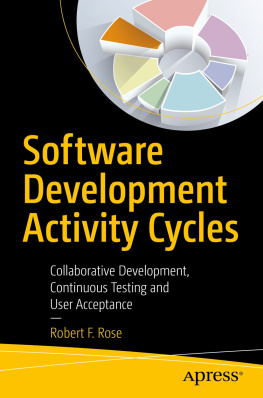
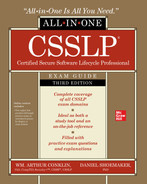
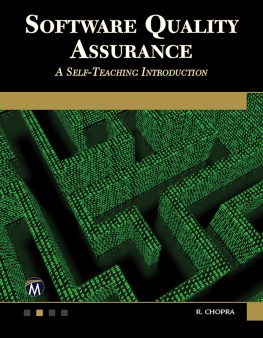
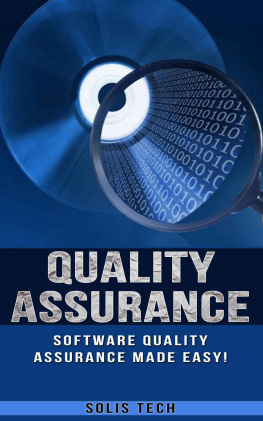
 Printed on acid-free paper
Printed on acid-free paper
